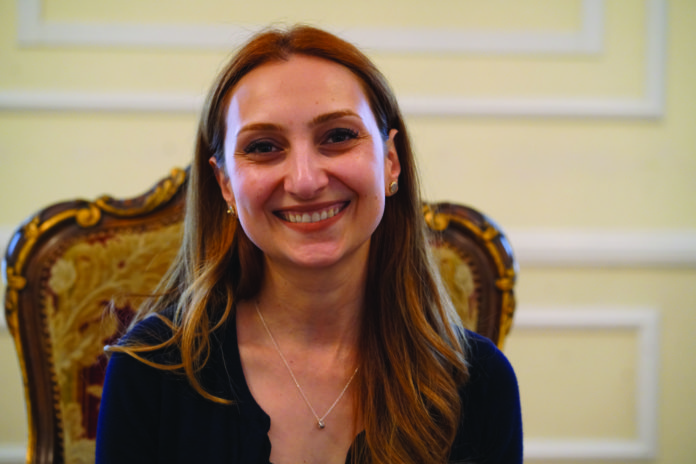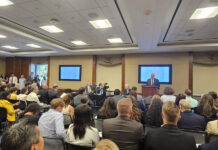WASHINGTON — Lilit Makunts was appointed as Armenia’s minister of culture on May 12. During a visit to the United States at the end of June she spoke about her background, the direction in which she wishes to steer her ministry, and her goals there, which in turn shed light upon the workings of the new Armenian government. The interview was conducted in English, which Makunts speaks fluently.
The 34-year-old minister previously was an associate professor at the Russian-Armenian University in Yerevan. She began teaching there in 2005 and in February 2018 became the head of the Department of International Cooperation at this university. Makunts received a master’s degree from the Faculty of Romance and Germanic Philology of Yerevan State University (YSU) in 2005 and the degree of candidate in Philological Sciences in 2014.
From her days as a student of linguistics and discourse at YSU (1999-2003) she was active in Armenian politics and worked for democratic change. She dramatically declared, in a recent interview (https://www.evnreport.com/raw-unfiltered/lilit-makunts-from-civic-to-political-to-cultural-engagement) conducted by Maria Titizian for EVN Report, “I was in my third year of university when I realized that I have the soul of a soldier of justice who wants to fight for things people will benefit from.” After graduation, she became professionally engaged in politics. She became a board member of the Liberal Party of Armenia (Hayastani Liberal Kusaktsutyun, not to be confused with the Armenian Democratic Liberal Party), and remained the head of its youth organization until 2012. In the following years she decided to take a different approach and pulled out of the direct political arena in order to teach youth in civil society how to work for social change. She declared to the Mirror, “I was taking part in the elections, and I was at the polling stations, and I would witness that unless we change ourselves, unless we change as citizens, we are not going to witness any change in the political arena.”
Makunts was able to do her political activity while teaching at the Russian-Armenian University. She said, “I was there because it was one of those universities where professors, teachers and students had the most freedom.” For example, during the 2008 presidential elections, YSU expelled a number of professors and students for their political activities, unlike her university. She also held more than one job, so did not worry as much about the effects of her actions. She said, “I was never limited with my opportunities. I knew that if I lost this job I could get another one. Probably this was the reason that I felt free. … Fortunately, I had the luxury and I had the opportunity of not being confined to one job.”
She studied at the International Center on Nonviolent Conflict (ICNC) Summer Institute (also known as the Fletcher Summer Institute for the Advanced Study of Nonviolent Conflict, at Tufts University, https://www.nonviolent-conflict.org/fletcher-summer-institute-2015/) in the summer of 2015 and was an ICNC Curriculum Fellow from 2016 to 2017, meaning according to the ICNC website, she received support for “teaching, course development and implementation of new curricular on civil resistance in universities and high schools around the world.”
Since 2016, she has been a contract specialist for the American Peace Corps. She also worked with the German nonprofit Friedrich Ebert Foundation, which has an office in Yerevan. For example, in October 2017, at the Fourth Eastern European Academy for Social Democracy, sponsored by this foundation in Georgia, she led a session on media training, teaching about media propaganda and manipulation.








